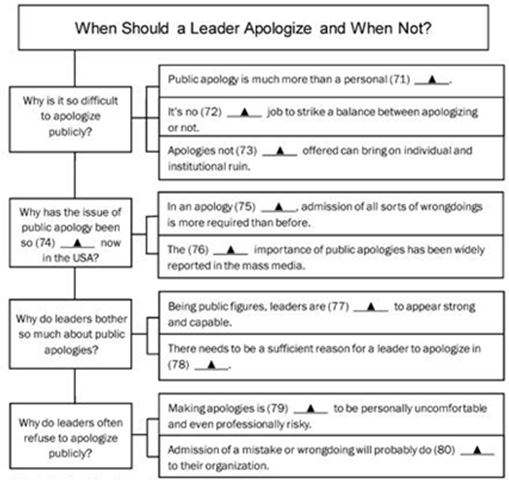题目内容
3.请认真阅读下列短文,并根据所读内容在文章后表格中的空格里填入一个最恰当的单词.注意:请将答案写在答题卡上相应题号的横线上.每个空格只填一个单词.
When Should a Leader Apologize and When Not?
Why Difficult?
When we wrong someone we know,even not intentionally,we are generally expected to apologize so as to improve the situation.But when we're acting as leaders,the circumstances are different.The act of apology is carried out not merely at the level of the individual but also at the level of the institution.It is a performance in which every expression matters and every word becomes part of the public record.Refusing to apologize can be smart,or it can be stupid.So,readiness to apologize can be seen as a sign of strong character or as a sign of weakness.A successful apology can turn hate into personal and organizational harmony-while an apology that is too little,too late,or too obviously strategic can bring on individual and institutional ruin.What,then,is to be done?How can leaders decide if and when to apologize publicly?
Why Now?
The question of whether leaders should apologize publicly has never been more urgent.During the last decade or so,the United States in particular has developed an apology culture-apologies of all kinds and for all sorts of wrongdoings are made far more frequently than before.More newspaper writers have written about the growing importance of public apologies.More articles,cartoons,advice columns,and radio and television programs have similarly dealt with the subject of private apologies.
Why Bother?
Why do we apologize?Why do we ever put ourselves in situations likely to be difficult,embarrassing,and even risky?Leaders who apologize publicly could be an easy target.They are expected to appear strong and capable.And whenever they make public statements of any kind,their individual and institutional reputations are in danger.Clearly,then,leaders should not apologize often or lightly.For a leader to express apology,there needs to be a good,strong reason.Leaders will publicly apologize if and when they think the costs of doing so are lower than the costs of not doing so.
Why Refuse?
Why is it that leaders so often refuse to apologize,even when a public apology seems to be in order?Their reasons can be individual or institutional.Because leaders are public figures,their apologies are likely to be personally uncomfortable and even professionally risky.Leaders may also be afraid that admission of a mistake will damage or destroy the organization for which they are responsible.There can be good reasons for hanging tough in tough situations,as we shall see,but it is a high-risk strategy.

分析 文章大意:本文主要阐述了 领导人什么时候该道歉什么时候不该道歉.文章分别从道歉为什么如此之难,为什么现在道歉,有什么困扰的以及为什么拒绝道歉这几个方面展开阐述.
解答 71:performance/act/activity 根据第一段第四句"It is a performance in which every expression matters and every word becomes part of the public record"可知,此处应为performance或类似内容.
72:easy 根据第一段的小标题Why Difficult?以及文章第一段but处点出当我们是领导时,道歉的情况就和一般情况不一样了,下面描述的都是作为领导人,道歉的难度.得出结论,it is no easy job…可判断出,领导人道歉是不容易的事情.
73:properly/appropriately/successfully/rightly 根据题干定位到文章第一段最后,破折号处引出该题.可见如果这种道歉没有很适当/正确的提出,就会造成个人和组织的毁灭.因此此空应填properly/rightly/successfully.
74:urgent 根据第二段第一句可知,领导人公开道歉已经成为紧要的事情.
75:culture 根据文章第二段第二句,破折号处的an apology culture,得出75空应填culture
76:growing/increasing/rising文章第二段倒数第二句,说明了More newspaper writers have written about the growing importance of public apologies.可见答案为growing/increasing/rising.
77:expected/supposed/required 根据题干定位到原文第三段.看到第四句"they are expected to appear and capable",因此可以填expected/supposed/required
78:public第三段第四句,写明了And whenever they make public statement of any kind,….可见这里填public
79:likely 根据第四段第三句可知,作为公众人物,道歉可能会在心理上觉得不舒服.
80:harm/damage 原文第四段第四句,说明"leaders may also be afraid that the admission of a mistake will damage or destroy….",可见此空可以填damage/harm.
点评 注意表格前的小标题,它通常是段落和表格的主题句,有助于理解文章.理解表格设计,表格一般包括列标题和行标题,通过阅读这些标题和表格里的内容;可迅速了解表格的结构和表格的设计原理.同时也可缩小信息范围,确定考查内容.

| A. | being delivered | B. | to be delivered | C. | to deliver | D. | delivered |
| A. | adaptation | B. | promotion | C. | devotion | D. | objection |
| A. | walked | B. | was walking | ||
| C. | had walked | D. | had been walking |